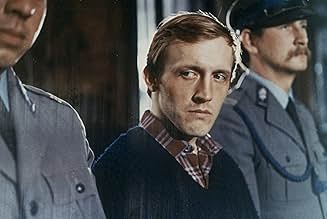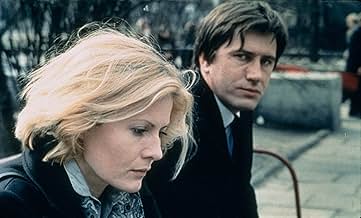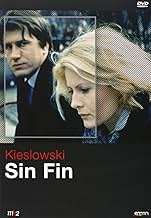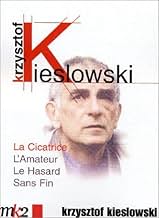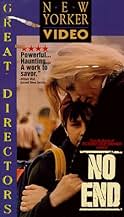VALUTAZIONE IMDb
7,3/10
6063
LA TUA VALUTAZIONE
La moglie dell'avvocato recentemente scomparso cerca di far fronte al dolore dopo la sua perdita e di portare avanti il suo ultimo caso in tribunale.La moglie dell'avvocato recentemente scomparso cerca di far fronte al dolore dopo la sua perdita e di portare avanti il suo ultimo caso in tribunale.La moglie dell'avvocato recentemente scomparso cerca di far fronte al dolore dopo la sua perdita e di portare avanti il suo ultimo caso in tribunale.
- Regia
- Sceneggiatura
- Star
Danny Webb
- American
- (as Daniel Webb)
Jacek Domanski
- Dzialacz opozycji
- (non citato nei titoli originali)
Recensioni in evidenza
I've began to follow Kieslowski over the past days, hoping to finally encounter his color films which I've seen for years pop up among the brilliant works. I watched this as background glimpse into his formative period. Interestingly he does two things:
One is he presents a world that has come undone and carries the past. A woman, her husband has died as the film begins, life has broken down and she has to go out and face it. Everything that she encounters is an echo from the past. Two instances that involve photos exemplify it; nude photos of her that her husband had found but he's now gone before she had a chance to explain, the other shows an idyllic summer that he possibly spent with another woman (before they met?). But also an old friend who now vies for her, a night of prostituting herself because he reminds her of her husband, being hypnotized to forget him conjures his presence, and round it goes from bewilderment to epiphany.
The other thing they do here is look to frame a response to bewilderment felt by Poles who had just been through strikes and martial law. A man is awaiting trial, different narratives are offered up by lawyers. Should he be pragmatic or protest? It's one of the threads that were left undone at the time of the husband's death who was a lawyer on the case. His own advice, which I perceive to be Kieslowski's, is for everyone to remove the distortions that prevent them from seeing each other.
Viewers who are content to encounter a life of episodic confusion will be happy with what he does. I miss a more penetratingly visual way of threading these events and, already from my brief glimpses into Dekalog, I believe it's this ability to surround and submerge causality that he's going to cultivate, a way of dreaming in advance. Here, tellingly, we have the husband announcing his own death in the very first shot whereas it could have been threaded as discovery and glimpsed in a haze (he already tries this by the first episode of Dekalog).
One is he presents a world that has come undone and carries the past. A woman, her husband has died as the film begins, life has broken down and she has to go out and face it. Everything that she encounters is an echo from the past. Two instances that involve photos exemplify it; nude photos of her that her husband had found but he's now gone before she had a chance to explain, the other shows an idyllic summer that he possibly spent with another woman (before they met?). But also an old friend who now vies for her, a night of prostituting herself because he reminds her of her husband, being hypnotized to forget him conjures his presence, and round it goes from bewilderment to epiphany.
The other thing they do here is look to frame a response to bewilderment felt by Poles who had just been through strikes and martial law. A man is awaiting trial, different narratives are offered up by lawyers. Should he be pragmatic or protest? It's one of the threads that were left undone at the time of the husband's death who was a lawyer on the case. His own advice, which I perceive to be Kieslowski's, is for everyone to remove the distortions that prevent them from seeing each other.
Viewers who are content to encounter a life of episodic confusion will be happy with what he does. I miss a more penetratingly visual way of threading these events and, already from my brief glimpses into Dekalog, I believe it's this ability to surround and submerge causality that he's going to cultivate, a way of dreaming in advance. Here, tellingly, we have the husband announcing his own death in the very first shot whereas it could have been threaded as discovery and glimpsed in a haze (he already tries this by the first episode of Dekalog).
Krystoff Kieslowski is today best known for his last four films, made wholly or partly in France, which in some ways is a shame, as while these movies are not without merit, they are outshone by the massive brilliance of his earlier, Polish work. Kieslowski was, of course, the greatest visual poet of communist architecture; and there's also something magical about the way he communicates the most intense emotion behind the facade of Slavic stoicism (witness, for example, in this film, the scene where the car is taken by the police). And also there was the subtext of the political beneath the personal, never more apparent than in 'No End', set (and, courageously, made) in the aftermath of the impact of the Solidarity movement on Polish society. In the face of civil unrest, the government had declared martial law, hoping to stave off a "friendly" Russian invasion; but system had lost confidence in itself, and had already effectively negotiated its own demise by the time the collapse of the Berlin wall finally cast it into oblivion. It's in this intermediate period, where normality intermingled with fear, that 'No End' unfolds, a drama that combines moral complexity and human sympathy in equal measure.
The first words of dialgoue in this film are "I died". Billy Wilder had planned to start 'Sunset Boulevard' in a similar manner, but the suits didn't like it and that film makes less sense as a result of the changes they demanded. More recently, films like 'Truly, Madly, Deeply' and 'The Sixth Sense' have repeated one idea explored in 'No End', that of the ongoing relationship between the living and the dead. But whereas both of those films are weighted down by obvious sentimentality, the opening speech in 'No End' is simple, disturbing, painfully real and yet leads naturally into something far more than a ghost story, a tale in which there is no right and wrong, but in which the mixed motives of the characters only illuminate their humanity.
Kieslowski is famous for his collaboration with Zbigniew Priesner, who wrote wonderful scores for this film (and all it's successors); but watching it, one is also struck by how well he used silence. He also had a talent for finding the most wonderfully expressive faces: the lawyer (Aleksander Bardini), the wife (Grazyna Szapolowska) and the client (Artus Barcis) all went on to appear in his 'Dekalog'. It's impossible to imagine a better actor than Bardini for his role; while Szapolowska appears more beautiful than any Hollywood starlet precisely because of the complete lack of glamour with which she is shot; her portrayal of a woman holding things together in the face of an unconquerable grief is wonderful and immensely sad.
There are so many moments of brilliance in this film, almost of all them unflaunted; the moment where the woman's son interrupts her phone call; the tiny flinch induced when a door closes behind her, the way that light floods a previously darkened room; the speech of introduction uttered by the lawyer; Kieslowski constantly finds the subtlest of ways to shed light on his subjects. This is a ten star film, made by a master, grounded in its era but which speaks of so much more. Now released on DVD, it has to be seen.
The first words of dialgoue in this film are "I died". Billy Wilder had planned to start 'Sunset Boulevard' in a similar manner, but the suits didn't like it and that film makes less sense as a result of the changes they demanded. More recently, films like 'Truly, Madly, Deeply' and 'The Sixth Sense' have repeated one idea explored in 'No End', that of the ongoing relationship between the living and the dead. But whereas both of those films are weighted down by obvious sentimentality, the opening speech in 'No End' is simple, disturbing, painfully real and yet leads naturally into something far more than a ghost story, a tale in which there is no right and wrong, but in which the mixed motives of the characters only illuminate their humanity.
Kieslowski is famous for his collaboration with Zbigniew Priesner, who wrote wonderful scores for this film (and all it's successors); but watching it, one is also struck by how well he used silence. He also had a talent for finding the most wonderfully expressive faces: the lawyer (Aleksander Bardini), the wife (Grazyna Szapolowska) and the client (Artus Barcis) all went on to appear in his 'Dekalog'. It's impossible to imagine a better actor than Bardini for his role; while Szapolowska appears more beautiful than any Hollywood starlet precisely because of the complete lack of glamour with which she is shot; her portrayal of a woman holding things together in the face of an unconquerable grief is wonderful and immensely sad.
There are so many moments of brilliance in this film, almost of all them unflaunted; the moment where the woman's son interrupts her phone call; the tiny flinch induced when a door closes behind her, the way that light floods a previously darkened room; the speech of introduction uttered by the lawyer; Kieslowski constantly finds the subtlest of ways to shed light on his subjects. This is a ten star film, made by a master, grounded in its era but which speaks of so much more. Now released on DVD, it has to be seen.
What has been seen of Krzysztof Kieslowski (almost all his films and 'Dekalog' in its entirety) all ranges between very good (the 8th episode of 'Dekalog') to masterpiece ('Three Colors: Red' and 'Blue' and the whole 'Dekalog' series). To me, he was an immensely gifted director, who died far too early.
'No End' is not one of Kieslowski's best, but like 'Camera Buff' it is another early film of his that deserves more love and attention. It may be alienating and strange to some viewers (its, as reasoned, pro-solidarity sentiments must have been reason enough for it to not be released internationally for over a year) and his more international work is somewhat more accessible. However, while some of the political story could have had more clarity in places, 'No End' is great in many ways with all the typical Kieslowski strengths that make his films so good.
As was always the case in Kieslowski's work, 'No End' is made exceptionally. As well as being beautifully shot with atmospheric use of colour to match the mood, it is gritty yet beautiful with many thoughtful and emotionally powerful images and little things lingering long into the memory. Kieslowski's direction is quietly unobtrusive, intelligently paced and never too heavy. The music is suitably intricate.
It's a thought-provoking film in writing, as ever thematically rich and with complex characters, and resists the trap of rambling. The 3-part story is intriguingly told, and while the political story could have done with more clarity the emotional story is harrowing and affecting and the metaphysical story fascinating. 'No End' is always engaging and suitably challenging. The acting is as always from Kieslowski marvellously nuanced and natural, especially from heart-wrenching Grazyna Szapolowska.
Summing up, not among the best work of Kieslowski but deserves more love as a result of being overshadowed by his later stuff from 'Dekalog' onward. 9/10 Bethany Cox
'No End' is not one of Kieslowski's best, but like 'Camera Buff' it is another early film of his that deserves more love and attention. It may be alienating and strange to some viewers (its, as reasoned, pro-solidarity sentiments must have been reason enough for it to not be released internationally for over a year) and his more international work is somewhat more accessible. However, while some of the political story could have had more clarity in places, 'No End' is great in many ways with all the typical Kieslowski strengths that make his films so good.
As was always the case in Kieslowski's work, 'No End' is made exceptionally. As well as being beautifully shot with atmospheric use of colour to match the mood, it is gritty yet beautiful with many thoughtful and emotionally powerful images and little things lingering long into the memory. Kieslowski's direction is quietly unobtrusive, intelligently paced and never too heavy. The music is suitably intricate.
It's a thought-provoking film in writing, as ever thematically rich and with complex characters, and resists the trap of rambling. The 3-part story is intriguingly told, and while the political story could have done with more clarity the emotional story is harrowing and affecting and the metaphysical story fascinating. 'No End' is always engaging and suitably challenging. The acting is as always from Kieslowski marvellously nuanced and natural, especially from heart-wrenching Grazyna Szapolowska.
Summing up, not among the best work of Kieslowski but deserves more love as a result of being overshadowed by his later stuff from 'Dekalog' onward. 9/10 Bethany Cox
I state for the record that I did not understand this film fully. The second plot with Solidarnost protester imprisoned and released by the court is not completely clear to me. Yet it has little to do with politics and more with human condition (ideals, expectation, compromise). Prisoner's family doesn't react happily upon his immediate release in a court room. There is awkwardness and embarrassment in that scene, as if some unforgivable compromise has been made and it tainted all of their relationship. Accident scene with a death of motorist seems random but reoccurring theme in Kieslowskij movies. Randomness of death, randomness of existence. Movie is wonderfully shot , music (as always) is haunting. I just cannot put it all together in my mind like I could with Veronique.
This is an excellent film and a great discovery. It's from about ten years before The Double Life Of Veronica and the Three Colours trilogy and is, it its way, equally good. It almost certainly inspired Truly, Madly, Deeply because the main story is about a young lawyer, Antek Zyro (Jerzy Radziwilowicz) who tells us at the outset that he is dead and spends the remainder of the film watching over his widow and young son. Grazyna Szpapolowska is outstanding, not to say beautiful, as the widow who 'feels' her husband everywhere and tries a variety of remedies - hypnosis, casual sex - to dispel his presence all to no avail. It's a stunning film shot in muted blue tones throughout and well worth a visit. 9/10
Lo sapevi?
- QuizThe film takes place in 1982.
- Citazioni
[First lines]
Antek Zyro: [speaking directly to the camera] I died - four days ago.
I più visti
Accedi per valutare e creare un elenco di titoli salvati per ottenere consigli personalizzati
- How long is No End?Powered by Alexa
Dettagli
Contribuisci a questa pagina
Suggerisci una modifica o aggiungi i contenuti mancanti

Divario superiore
By what name was Senza fine (1985) officially released in India in English?
Rispondi
